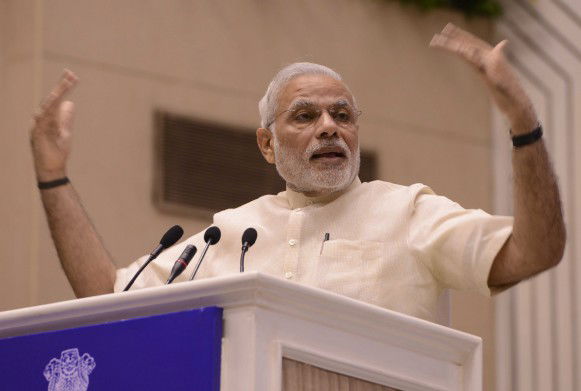Articles features
Bihar poll the real test for Modi

Roughly 32,000 new voters enrolled in each constituency for this year's
assembly election in Bihar may play a decisive role in determining the
ultimate poll result. The presence of these new voters becomes important
in the light of the fact that during the last two assembly elections in
the state, the victory margins of many of the winning candidates ranged
between 12,000 and 13,000 votes.
But there are plenty of ifs and
buts before the state goes to the polls. The electoral behaviour of the
Hindi-speaking states in the Indo-Gangetic plain is always influenced
by caste factors and here, Chief Minister Nitish Kumar and Lalu Prasad
Yadav, a former chief minister and one of the principal players of
caste-based politics in India, have stolen a march by stitching up an
alliance and announcing their respective share of seats. There is reason
for the Bharatiya Janatta Party (BJP) to feel a bit rattled as it
cannot field an equally powerful counter-combination of castes and,
therefore, has fallen back on its slogan of "development" as can be
understood from Prime Minister Narendra Modi's announcement of a grant
of Rs.1.25 lakh crore for Bihar.
But this slogan of
"development", together with a sense of "national perspective", as
described by the BJP, had enabled the constituents of the National
Democratic Alliance (NDA) it leads to capture 31 seats out of 40 in
Bihar during the 2014 parliamentary elections. The NDA's combined
vote-share was 38.8 percent while the BJP's individual share in this
stood at 29.86 percent. However, the vote share of the opposition
parties consisting of the Janata Dal-United (JD-U), the Congress and the
Rashtriya Janata Dal (RJD) combined was much more than that of the NDA.
This is the source of worry for the BJP.
The BJP's traditional
vote-base consists of the Brahmins and the Baniyas of Indian society.
Party veteran L.K. Advani first tried to broadbase it by his concept of a
broader Hindutva. The BJP could successfully romp home in the last Lok
Sabha elections in spite of its divorce from Nitish Kumar, who
represented the other backward class (OBC) interests. This was because a
significant number of OBC votes and even a slight amount of Muslim
votes had swung towards the BJP. But this is unlikely to happen now.
This
time, the BJP can safely count on 14 percent upper-caste votes, six
percent Vaishya votes, around six percent votes that are likely to go to
the Lok Janshakti Party of Ram Vilas Paswan and four percent votes of
the Rashtriya Lok Samta Party of Upendra Kushwaha. Former chief minister
Jitan Ram Manjhi, hailing from the Musahar caste and representing the
interests of the 'mahadalits', can bring in another five to six percent
votes. But this may not be enough for the BJP to secure a convincing
victory.
Against this backdrop, the new voters have become
important for the BJP as they may not have been bitten by the caste bug.
But the BJP's greatest worry should come from the Muslims, who
constitute nearly 15 percent of the voters. For a long time since the
1990s, the RJD garnered most of their votes. Latest indications,
however, are that they are again switching their loyalty to the
Congress.
This will certainly give the JD-U-RJD-Congress combine
extra advantage. In the 2014 parliamentary polls these parties together
had received 45.6 percent votes. But for tilting the scales in their
favour, both the combines are expected to rely heavily on the extremely
backward castes (EBCs) who constitute nearly 24 percent of the Bihar
populace. In 2014, 53 percent of this group had voted for the BJP. How
they would cast their votes this time has become an important question.
In
all probability, the JD-U will be able to retain its 16.4 percent vote
base. The Congress is also expected to maintain its 8.56 percent share.
About the RJD, however, there are some reasonable doubts. In 2014 it had
received 20.46 percent votes. But this time there are two spoilsports -
the Garib Janata Dal (Secular) of Sadhu Yadav and the Jana Adhikar
Mancha of Pappu Yadav. Both are likely to cut into the RJD vote-share in
some pockets. At the same time they have, till now, declared their
support for Jitan Ram Manjhi - which may harm the JD-U a bit.
On the whole, the Bihar election result is likely to be a cliff-hanger - and the real test for Narendra Modi.
(Amitava
Mukherjee is a senior journalist and commentator. The views expressed
are personal. He can be contacted at amukherjee57@yahoo.com)







































